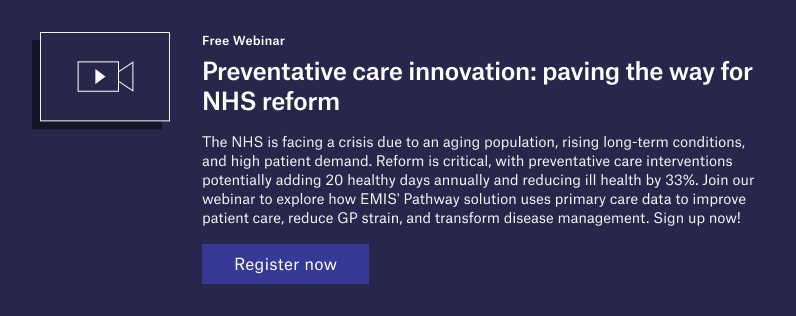
As part of its long-term plan launched in 2019, the UK’s National Health Service (NHS) preventative care mission aims to reduce health inequalities, lower healthcare costs, and improve the quality of life for individuals by preventing health issues before they arise. This approach marks a shift from reactive to proactive healthcare, focusing on early detection and intervention to manage health risks more effectively.
Chronic diseases such as diabetes, cardiovascular diseases, and certain types of cancer account for a significant portion of healthcare costs and patient morbidity. By focusing on prevention, the NHS aims to alleviate the long-term burden on healthcare resources, improve patient outcomes, and enhance overall public health.

One exemplary initiative is the NHS England Hepatitis C Elimination Programme, which involves close collaboration with NHS England, the Hepatitis C Trust, NHS secondary care teams known as Operational Delivery Networks (ODNs), and the pharmaceutical industry. This project is on track to eliminate Hepatitis C as a public health concern by 2025, with comprehensive screening, early diagnosis, and immediate treatment.
How can pharma get involved?
Life science companies have resources and knowledge to help support and enhance preventative care initiatives aligned to their strategic therapy areas. By collaborating with the NHS, the pharmaceutical industry can contribute to the development and implementation of cutting-edge technologies that facilitate early diagnosis and intervention. These projects can contribute to evidence of the impact these technologies can have, which can support the business cases to drive scale and adoption.
Involvement in preventative care initiatives offers several benefits not just for patients, but for pharmaceutical companies themselves. Firstly, it strengthens partnerships with healthcare providers and policymakers, fostering a collaborative environment conducive to innovation. Secondly, early engagement in preventative care can lead to the development of new markets and revenue streams, particularly as the healthcare paradigm shifts towards value-based care.
The proactive stance in supporting preventative care aligns with the growing emphasis on corporate social responsibility (CSR). Patients, healthcare providers, and the public increasingly expect pharmaceutical companies to contribute to broader societal goals. By investing in preventative care, pharmaceutical companies can demonstrate a commitment to improving public health beyond the confines of traditional treatment paradigms.
But success often depends on innovative approaches for reaching the right patients. Pathway is a comprehensive data integration and analytics tool designed to support healthcare providers in the delivery of proactive care. It enables real-time access to patient data stored in EMIS Web, the UK’s most widely used clinical system for primary care, facilitating early diagnosis, personalised treatment plans, and efficient management of chronic diseases. Pathway specifically helps pharmaceutical companies to identify the ideal patients for their preventative care programme, offering insights into patient outcomes and clinical pathways and enhancing collaboration with healthcare professionals to improve public health initiatives.
Using clinical intelligence, Pathway enables the case finding of at-risk patients to be identified from within their primary care clinical system so that healthcare teams can refer these patients onto the appropriate care pathway, often managed by specialist or community care services. For instance, in the Hepatitis C Elimination Programme, Pathway is helping secondary care teams identify at-risk populations, track the effectiveness of interventions, and optimise resource allocation. This not only aids in achieving public health goals but also demonstrates the potential of preventative care models to reduce long-term healthcare costs.
The focus of the NHS on preventative care reflects a broader global trend towards sustainability and efficiency in healthcare. With the ever-increasing burden of chronic diseases, healthcare systems worldwide are looking for innovative solutions to keep populations healthier for longer. Life sciences companies are uniquely positioned to support these efforts through advanced technologies, data analytics, funding, and medical expertise. By engaging with initiatives such as the NHS’s Hepatitis C Elimination Programme and leveraging tools such as Pathway, the pharmaceutical industry can help drive the future of healthcare towards a more sustainable and effective model.


